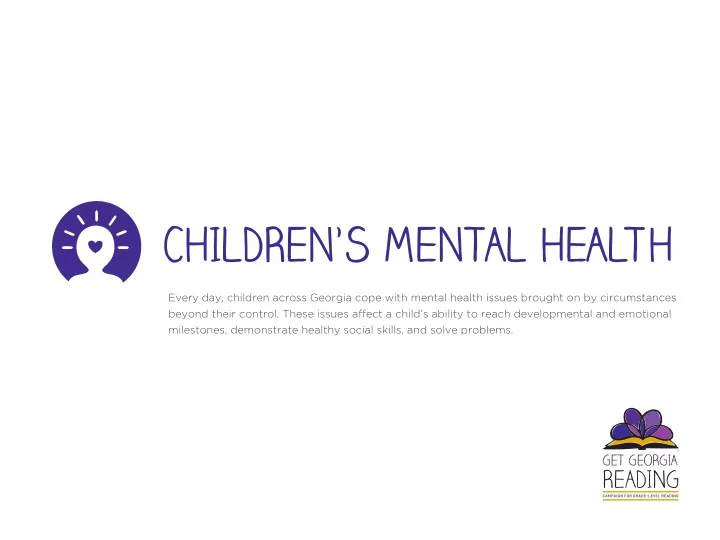

CHILDREN’S MENTAL HEALTH Every day, children across Georgia cope with mental health issues brought on by circumstances beyond their control. These issues affect a child’s ability to reach developmental and emotional milestones, demonstrate healthy social skills, and solve problems.
1 in 5 children ages 3 to 17 has a diagnosable mental health disorder. Centers for Disease Control and Prevention [2013]
Children are being expelled from child care at a rate 3X that of grades K-12. Access to mental health consultation is linked to significantly lower rates of expulsion in child care. Journal of Child and Family Studies [2008]
Quality child care is associated with reduced risk of behavior problems among 1- to 5-year-old children of mothers with maternal depression. Journal of Child Psychology and Psychiatry [2017]; JAMA Psychiatry [2013]
Children with untreated mental health problems miss as many as 22 days of school each year. Special Education Elementary Longitudinal Study [2004]
Children who are visually impaired are at significantly higher risk of developing mental health problems than their sighted peers. Journal of Developmental Medicine & Child Neurology [2016]
4 out of 5 children ages 5 to 13 with emotional and behavioral disorders have significant language deficits. Journal of the Council for Exceptional Children [2014]; Journal of Abnormal Psychology [2013]
Up to 14.2% of children under age 5 experience social-emotional problems that negatively impact their functioning, development, and school readiness. Public Health Reports [2006]
Compared to their counterparts, children placed in foster care are: 6X more likely to exhibit behavior problems more likely to have hearing and 3X vision problems more likely to suffer from 2X language impairment
A positive school climate is associated with students’ increased self-esteem, positive behavioral adjustment, and fewer depressive symptoms and psychiatric problems. Oxford Research Encyclopedia of Education [2017]
In the earliest years, mental health disorders often result from problems in the child’s primary attachment relationship. Zero to Three [2012]
Recommend
More recommend